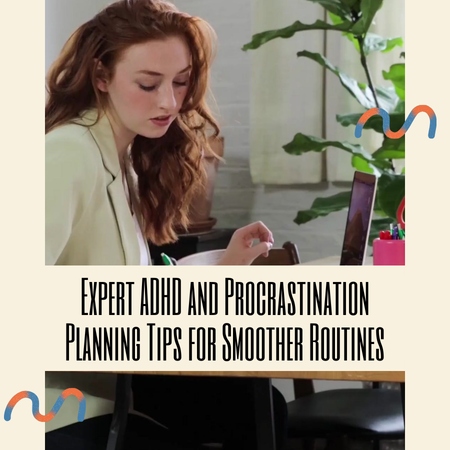Does cleaning your house for a dinner party feel overwhelming? Does the pressure you feel during finals week make you want to binge-watch Ted Lasso? Do you worry that your efforts on large tasks will not be good enough?
A large share of people with ADHD anticipate these experiences when they have complex projects or a daunting list of tasks to complete. This anticipation of feeling overwhelmed often leads these individuals to procrastinate. This article intends to break down the workings of the ADHD brain that frequently create emotional states that lead to procrastination. At the same time, there are numerous strategies that all individuals can use to keep procrastination in check.
ADHD Brain Chemistry Ripe for Procrastination
Symptoms of ADHD have been found to play a clear role in procrastination. One ADHD researcher found that 75 percent of individuals with ADHD were considered “chronic” procrastinators, compared to 35 percent of individuals without this condition.
Critical components of the brain chemistry of individuals with ADHD pose challenges for successful executive functioning regarding task and time management. These individuals have difficulty figuring out where to begin on tasks and to prioritize, sequence, and plan. They also struggle to estimate the time it will take to complete tasks and track the passage of time, often putting off starting chores or assignments in the belief that they need less time than they actually do to complete these. The variation in the capacity for planning and carrying out tasks increases the likelihood of those with ADHD feeling overwhelmed.
People with ADHD may additionally have negative emotions and beliefs about themselves that arise when large tasks are in front of them. Fears of completing a task incorrectly or imperfectly and a fear of failure can lead to procrastination. Individuals with ADHD commonly develop negative internal dialogues with thoughts including “I do not know how to do this”, “I will never finish on time”, “I am not good enough”, and “I am lazy”. Others with ADHD set unrealistically high expectations for their work that reflect perfectionism, result in indecisiveness, and in turn are crippling for productivity.
Moreover, the manner in which dopamine is released into the brains of those with ADHD considerably impacts the level of sustained attention of these individuals as well as their propensity for distraction when faced with complicated tasks. Studies have established that dopamine is often inconsistently and insufficiently released in the brain networks that manage executive functioning in people with ADHD. The release of dopamine is stimulated only by activities that those with ADHD have a strong interest in. In turn, it is difficult for these individuals to sustain alertness, attention, and motivation when they are not interested in and stimulated by the task at hand.
The official diagnosis for the predominantly inattentive variation of ADHD can include being easily distracted by extraneous stimuli. Such stimuli and internal thoughts can indeed pose challenges for people with ADHD in their efforts to start on chores or assignments. Undesirable tasks can be so daunting for these people that they may get sidetracked by more interesting tasks or thoughts when they attempt to work on the tasks in front of them. Or they may avoid the task at hand completely and actively seek out activities that bring them stimulation and immediate gratification instead.
At the end of the day, individuals with ADHD often procrastinate tedious or boring tasks, and this procrastination commonly persists until close to deadlines. In these situations, these people frequently feel too much pressure to motivate themselves or get stuck, leading them to not ultimately complete their tasks.
Effective Strategies for Executive Functioning
At the same time, individuals with and without ADHD have found a variety of strategies helpful for minimizing procrastination and persisting to complete tasks.
Mindfulness. Practicing mindfulness broadly outside of contexts that involve a daunting large task or task list can help those with ADHD improve their executive functioning. Helpful mindfulness practices include deep breathing throughout the day, scanning the body to see how it feels and for tension, and becoming aware of thoughts and what to focus on instead.
Break large tasks and projects into smaller pieces. This can keep tasks from feeling too daunting for individuals with ADHD. One clinician suggests cleaning the top shelf one day, the clothes on the hanging rack another day, and everything on the floor on a third day instead of cleaning a whole closet at once. If there are numerous tasks to complete rather than one large project, making a list only of tasks to complete today, or even only of items for the next four hours, can make working on these items less intimidating.
Just get started. Simply starting a task makes it easier to follow through on it, even if it is begun in a sloppy manner.
Limit distractions. Having attention diverted while trying to begin a project can lead those with ADHD to procrastinate. One clinician suggests silencing phones and televisions while working on tasks, as well as letting other people know you do not want to be disrupted.
Determine time needed for tasks and take breaks. Individuals must first determine the amount of time they want to spend on a project or list of chores. Once they have done this, they can use the Pomodoro Technique, a time management tool developed by author and business consultant Francesco Cirillo. This technique consists of the following steps:
- Identify a task.
- Set aside a certain number of minutes to work without stopping and without interruptions. This time can increase slowly.
- When time is up, take a short break for about five minutes. To avoid turning this break into procrastination, set alarms for when the break starts and ends.
- Repeat this process four times and then take a longer break, for about 20 minutes.
During breaks, activities such as walking, stretching, or exercising can refresh the mind and provide an energy outlet.
Create rewards. If individuals with ADHD are procrastinating tasks because they are tedious or boring, it can be helpful to create a reward for after the tasks are completed. The knowledge that a reward awaits these individuals after finishing the projects can help individuals push through emotions that cause them to put off the projects. Health providers suggest rewards including nature hikes, hot baths, naps, and snacks.
Optimize time when you have the most energy and focus. Individuals should complete projects and tasks they are most likely to procrastinate during times of the day when they have the most energy and focus. If there are times of the day when you struggle to concentrate, avoid difficult or tedious tasks during these times.
Connect new habits to established habits. James Clear, the author of the book Atomic Habits, recommends pairing a new habit with one that is already established. For example, a person who wants to start writing a daily task list can pair this habit with drinking coffee in the mornings. According to Clear, “The more you do something, the stronger and more efficient the connection [between your brain and your behaviors] becomes.”
Maintain positive self-talk and realistic expectations. The internal dialogues people have about the tasks in front of them have a strong impact on how they approach these tasks and whether they complete them. Replacing negative thoughts with more positive ones can help individuals manage anxiety and start on projects. Realistic thought patterns include “My work does not have to be perfect”, “I am a work-in-progress”, and “Let me work for 15 minutes for now”. In addition, a mindset of “done is better than perfect” can be useful for those struggling with perfectionism.
Find an accountability partner. An accountability partner can provide support that can be helpful for staying on track towards goals for completing projects. Individuals can let accountability partners know what they want to complete, and ask them to check in on their progress over the course of the day. According to the U.S. government’s Office of Personnel Management (OPM), when employees are held accountable in the workplace, they feel competent, perform better, are more committed to their work, and report high satisfaction with work.
Final Thoughts
Thinking of procrastination as a manifestation of ADHD symptoms that lead individuals to feel overwhelmed is a profoundly different mindset than the “Just Do It” mantra that many people have internalized. In addition, the numerous strategies for containing procrastination and following through on projects could be tedious for some individuals with ADHD in the same way as the projects they are procrastinating.
Nevertheless, scores of individuals who struggle with executive functioning still succeed in pursuing their goals and creating renowned artistic works. Architect Frank Lloyd Wright procrastinated designing one of his most well-known houses, Fallingwater in Pennsylvania, for nine months after first receiving his commission for the home. Wright ultimately drew up his entire plans for this house in about two hours while his patron was on his way to meet with him, according to several witnesses. Classical music composer Wolfgang Amadeus Mozart waited to compose the score to one of his most renowned operas, Don Giovanni, until the morning the piece was scheduled to premiere. This was after the premiere had been pushed back for two weeks and after Mozart had been out late drinking adult beverages with his wife the night before the premiere.
It is indeed possible for people who avoid their tasks on occasion to create masterpieces that many others seek out when they want to escape their own work.
References
- American Psychiatric Association. (2013). Diagnostic and Statistical Manual of Mental Disorders, Fifth Edition. American Psychiatric Association.
- Brown, T.E. (2024, April 8). The mystery of ADHD motivation, solved. ADDitude.
https://www.additudemag.com/adhd-motivation-problems-getting-started-on-tough-projects/ - Gillette, H. (2022, May 4). All About ADHD Paralysis. PsychCentral.
https://psychcentral.com/adhd/adhd-paralysis - Gonzalez-Pons, K. (2021, July 29). How to Stop Procrastinating if You Live with ADHD. PsychCentral.
https://psychcentral.com/adhd/how-to-stop-adhd-procrastination - Low, K. (2023, March 3). The Relationship Between ADHD and Procrastination. VeryWell Mind.
https://www.verywellmind.com/adhd-and-chronic-procrastination-20379 - Myers, M. (2021, December 1). Last-Minute Masterpieces of Procrastinating Composers. All Classical
Radio. https://www.allclassical.org/procrastinating-composers/




Comments are closed.